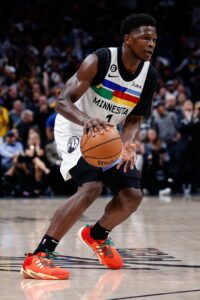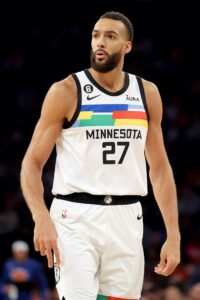The Timberwolves have historically been one of the worst teams in the league, particularly before and after the Kevin Garnett era. But they were one of the best stories of 2021/22, doubling their win total by going 46-36 and making the playoffs as the No. 7 seed before losing their first-round series against Memphis in six games.
Minnesota was determined to avoid regression last offseason and made one of the most shocking trades in NBA history, dealing away three rotation players, five first-round picks and a pick swap for center Rudy Gobert. Unfortunately, his frontcourt partner Karl-Anthony Towns missed much of ’22/23 due to a major calf injury, so the Wolves still only have a small sample size to examine the fit between the two former All-NBA big men.
The Wolves hovered around .500 for much of the season, ultimately finishing 42-40 and avoiding the risk of draft-lottery disaster by making the playoffs as the No. 8 seed (Utah controls Minnesota’s first-round pick, No. 16 overall). Late-season injuries to Naz Reid and Jaden McDaniels hurt their depth entering the postseason though, and the Wolves lost their first-round series to the Nuggets in five games.
While it’s a noteworthy accomplishment that the Wolves made the playoffs in consecutive seasons for the first time since 2002-04, they have their sights set much higher going forward after trading away so many assets for Gobert.
The Timberwolves’ Offseason Plan
 Minnesota is faced with a lot of difficult questions this offseason. The most prominent is whether or not the pairing of Gobert and Towns can ultimately lead to a championship when they’re taking up such a huge portion of the payroll, especially when it’s clear the future hinges on the evolution of Anthony Edwards (and, to a lesser extent, Jaden McDaniels).
Minnesota is faced with a lot of difficult questions this offseason. The most prominent is whether or not the pairing of Gobert and Towns can ultimately lead to a championship when they’re taking up such a huge portion of the payroll, especially when it’s clear the future hinges on the evolution of Anthony Edwards (and, to a lesser extent, Jaden McDaniels).
I’m not going to go too deep into revisiting the Gobert trade, but needless to say it does not look good at all for the Wolves. Is there anyone right now that would even take Gobert in a one-for-one trade for Walker Kessler, the No. 22 overall pick last year who was sent to the Jazz as part of the deal?
Gobert makes $131.5MM over the next three seasons and will turn 31 years old next month. Kessler, who finished third in Rookie of the Year voting and nearly doubled Gobert’s block total (173 vs. 95) in far fewer minutes, will earn $10.7MM over the next three seasons and turns 22 in July. And the Wolves still owe the Jazz four additional first-rounders and a pick swap, not to mention the other players involved.
But I digress. Gobert is on the roster now, and the Wolves can only hope that he returns next season as the dominant paint protector he had been for the better part of the past decade. That version of Gobert was not present for much of ’22/23 — he didn’t receive a single vote for All-Defense or Defensive Player of the Year after making six consecutive All-Defensive First Teams and winning three Defensive Player of the Year awards from 2016-22. His trade value has bottomed out, because he has never been a great offensive player.
The Wolves will almost certainly offer Edwards a rookie scale max extension, and his fellow 2020 draft class member McDaniels is likely to get a very lucrative extension as well. It will be interesting to see exactly how much he receives with the addition of a possible fifth year for non-max rookie scale extensions.
Those extensions won’t take effect until ’24/25, which gives the Wolves a little bit of breathing room this offseason. But that’s also the main reason why I think they should explore the trade market for Towns this offseason in an effort to split his salary slot into smaller pieces. It doesn’t seem like they’ll actually do that, but that’s what I would do.
After signing a super-max extension last summer following an All-NBA appearance in ’21/22, Towns will earn an estimated $220MM+ from 2024-2028 (35% of the salary cap). Edwards will likely be making 25-30% of the cap as well, depending on whether he makes an All-NBA team next season. Gobert will be making nearly $44MM in 2024/25, which is close to the max. Even conservatively projecting McDaniels for a salary of $20MM, the Wolves would be faced with an enormous payroll two years from now. That isn’t sustainable.
Towns is an incredibly skilled and talented offensive player, but he doesn’t make great decisions and I doubt he’ll ever hold up well enough on defense to be worth that financial commitment. His brief playoff performances have been uneven at best.
The question is, what can they get for Towns? He’s only 27, so he’s theoretically in his prime. Minnesota wants to give itself the best chance to win the championship, so draft picks are unlikely to be of interest unless they can be rerouted as part of a three-way trade. Young players on rookie contracts would be appealing, but matching salaries wouldn’t be easy.
The Wolves are highly likely to guarantee the salaries of Mike Conley and Taurean Prince for ’23/24, as both were key rotation members last season. That would push their ’23/24 payroll up to $139.8MM — over the projected $134MM cap — with nine players under contract. Staying under the $162MM luxury tax while improving the roster will be tricky, especially when considering their own free agents, which include Nickeil Alexander-Walker, Jaylen Nowell and Naz Reid.
I really like Alexander-Walker’s defense, but I’m not sure he’s a lock to receive the $7MM qualifying offer that would make him a restricted free agent. If the Wolves don’t issue the QO, the 24-year-old would be unrestricted and free to sign with any team. That doesn’t mean the Wolves couldn’t bring him back, but it would be a risk if they do want to retain him, since they’d lose control of the process.
The other young guard, Nowell, might have one foot out the door already, based on various reports throughout the season. He seems intent on testing his value on the open market. Interest seems likely to be tepid though after a down season that saw him shoot just 28.9% from deep.
Reid, on the other hand, should attract a lot of interest after a career year. The Wolves have said they want to retain him, and they have his Bird rights, but I wonder if he’ll look for an opportunity for more minutes elsewhere in his first foray into free agency. Losing him would be a big blow to the team’s frontcourt depth, but you could also argue it would be difficult to justify paying him with Gobert and Towns already under long-term contracts. I’m very curious to see what type of deal he’ll get. I would rather have Reid at around $12MM per year than pay Towns four or five times that much in the future.
Jordan McLaughlin, whose contract is non-guaranteed, had a disappointing and injury-riddled season as the backup point guard. His contract is affordable enough, but I think the Wolves will look to upgrade that position, whether it be in free agency or via trade. Conley showed he could still contribute at a quality level last season, but he’ll be 36 when next season starts and on an expiring contract. Point guard is a position to watch going forward in Minnesota.
How many of their own free agents the Wolves retain — and how much they pay them — will determine whether or not they’ll have access to the full mid-level exception to sign other free agents.
Salary Cap Situation
Guaranteed Salary
 Rudy Gobert ($41,000,000)
Rudy Gobert ($41,000,000)- Karl-Anthony Towns ($36,016,200)
- Mike Conley ($14,320,000)
- Note: Partial guarantee. Rest of salary noted below.
- Anthony Edwards ($13,534,817)
- Kyle Anderson ($9,219,512)
- Jaden McDaniels ($3,901,399)
- Wendell Moore ($2,421,720)
- Josh Minott ($1,719,864)
- Total: $122,133,512
Dead/Retained Salary
Player Options
Team Options
- Nathan Knight ($1,997,238): Early Bird rights
- Note: Knight’s salary would be partially guaranteed ($380,718) if his option is exercised.
- Total: $1,997,238
Non-Guaranteed Salary
- Mike Conley ($10,040,000)
- Note: Partial guarantee. Conley’s salary would become fully guaranteed if he’s not waived on or before June 24.
- Taurean Prince ($7,650,000)
- Note: Prince’s salary would become fully guaranteed if he’s not waived on or before June 28.
- Jordan McLaughlin ($2,320,000)
- Note: McLaughlin’s salary would become fully guaranteed if he’s not waived on or before June 30.
- Total: $20,010,000
Restricted Free Agents
Two-Way Free Agents
Draft Picks
- No. 53 overall (no cap hold)
Extension-Eligible Players
- Mike Conley (veteran)
- Rudy Gobert (veteran)
- Jordan McLaughlin (veteran)
- Jaylen Nowell (veteran)
- Naz Reid (veteran)
- Anthony Edwards (rookie scale)
- Jaden McDaniels (rookie scale)
Note: These are players who are either already eligible for an extension or will become eligible before the 2023/24 season begins. Nowell and Reid are only eligible until June 30.
Unrestricted Free Agents / Other Cap Holds
- Evan Turner ($27,909,834 cap hold): Bird rights
- Jaylen Nowell ($1,989,698 cap hold): Bird rights
- Naz Reid ($1,989,698 cap hold): Bird rights
- Austin Rivers ($1,989,698 cap hold): Non-Bird rights
- Aaron Brooks ($1,989,698 cap hold): Non-Bird rights
- Greg Monroe ($1,989,698 cap hold): Non-Bird rights
- Total: $37,858,324
Note: The cap holds for Turner, Brooks, and Monroe remain on the Timberwolves’ books from prior seasons because they haven’t been renounced. They can’t be used in a sign-and-trade deal.
Cap Exceptions Available
- Mid-level exception: $12,220,600
- Bi-annual exception: $4,448,000
- Trade exception: $4,374,000
- Trade exception: $3,688,117
Note: The Timberwolves would lose access to the full mid-level exception and the bi-annual exception if their team salary surpasses the tax apron.
 Minnesota is faced with a lot of difficult questions this offseason. The most prominent is whether or not the pairing of Gobert and Towns can ultimately lead to a championship when they’re taking up such a huge portion of the payroll, especially when it’s clear the future hinges on the evolution of
Minnesota is faced with a lot of difficult questions this offseason. The most prominent is whether or not the pairing of Gobert and Towns can ultimately lead to a championship when they’re taking up such a huge portion of the payroll, especially when it’s clear the future hinges on the evolution of  Rudy Gobert
Rudy Gobert